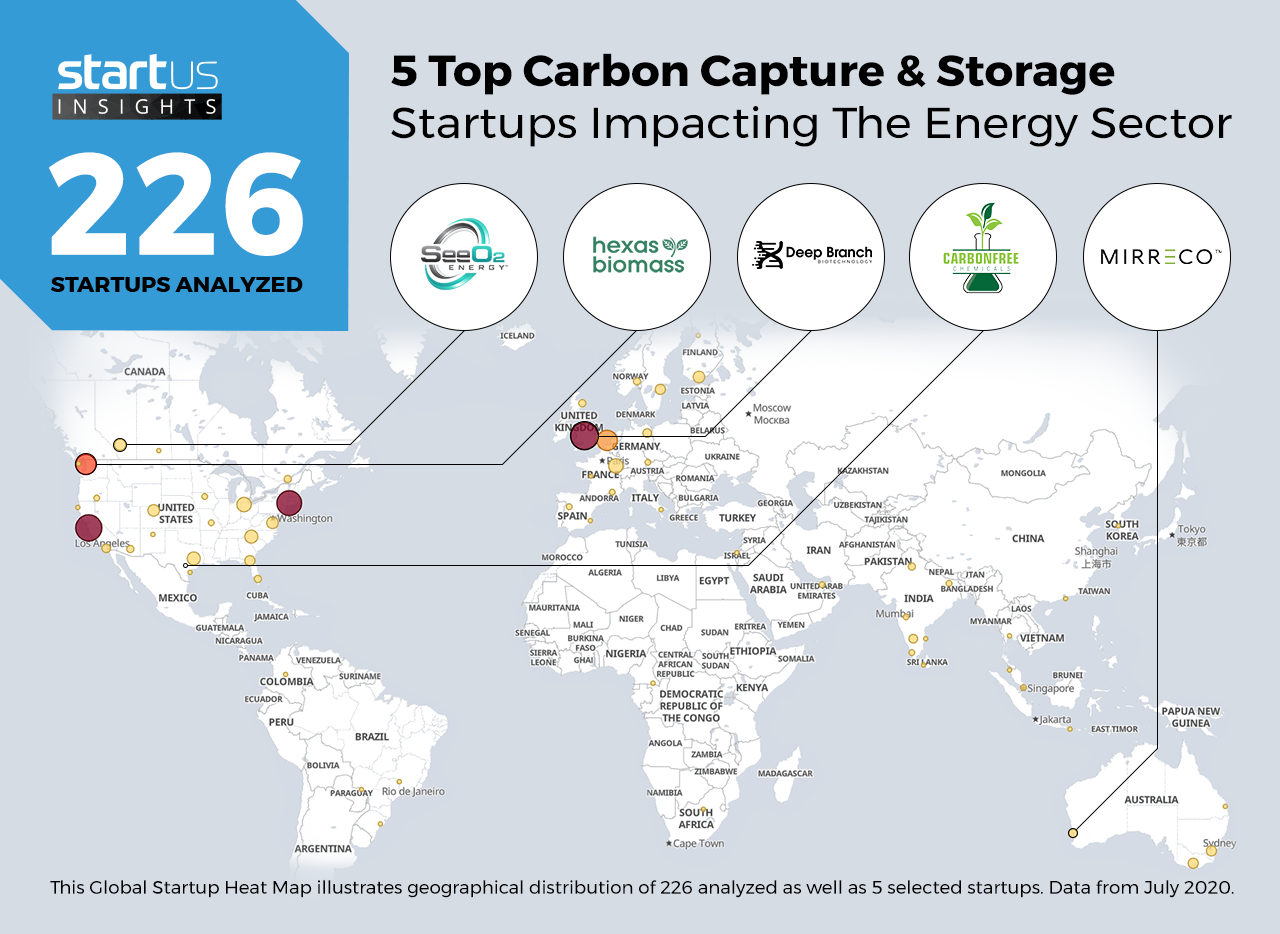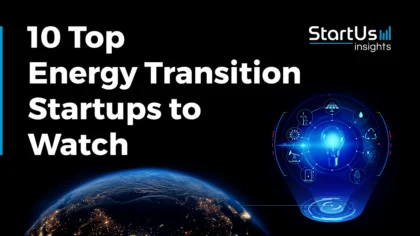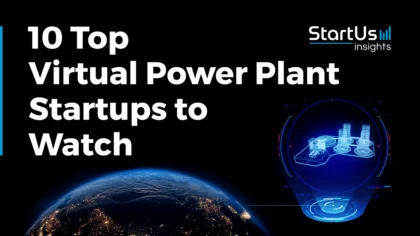Accelerate Productivity in 2025
Reignite Growth Despite the Global Slowdown
Our Innovation Analysts recently looked into emerging technologies and up-and-coming startups working on solutions for the energy sector. As there is a large number of startups working on a wide variety of solutions, we want to share our insights with you. This time, we are taking a look at 5 promising carbon capture & storage startups.
Heat Map: 5 Top Carbon Capture & Storage Startups
The insights of this data-driven analysis are derived from the Big Data & Artificial Intelligence-powered StartUs Insights Discovery Platform, covering 2.093.000+ startups & scaleups globally. The platform gives you an exhaustive overview of emerging technologies & relevant startups within a specific field in just a few clicks.
The Global Startup Heat Map below reveals the distribution of the 226 exemplary startups & scaleups we analyzed for this research. Further, it highlights 5 energy startups that we hand-picked based on criteria such as founding year, location, funding raised, and more. You get to explore the solutions of these 5 startups & scaleups in this report. For insights on the other 221 carbon capture & storage solutions, get in touch.
See O2 Energy – Carbon Emissions To Fuel
Removing greenhouse gases (GHGs) from the atmosphere, by implementing technology to capture and store carbon dioxide, is one of many technologies required to meet global climate targets. This technology has the potential to significantly reduce carbon emissions from industrial processes and burning fossil fuels. One technique to achieve this is by breaking down GHGs into various fuels, which are later used for generating power or heat. Startups today work on energy technologies to convert power to gas or other fuels.
See O2 Energy is a Canadian startup working to efficiently convert carbon dioxide and water into marketable and clean value-added products using reversible fuel cell technology. The startup is developing reversible solid oxide fuel cells to enable the electrochemical conversion of water to hydrogen and carbon dioxide to carbon monoxide. This results in the production of syngas, a mixture of carbon monoxide and hydrogen. This solution makes it possible to effectively capture and use carbon to produce fuels, power, heat, and oxygen.
Mirreco – Carbon Emissions Into Industrial Hemp
From paper, textiles, biodegradable plastics, construction, food, and fuel, industrial hemp provides several applications. As one of the fastest-growing biomasses, hemp currently delivers exciting value for industrial carbon capture. Hemp is also suitable for mitigating against potentially harmful substances, such as dioxins, which are carcinogenic and contribute to deforestation, cosmetics, and plastics accumulation, most of which require fossil fuels and do not easily degrade.
Australian startup MIRRECO combines non-synthetic advanced polymers and hemp to create hemp CAST, Carbon Asset Storage Technology, products. By blending hemp with proprietary polymers, the technology completes a carbon-storing polymer chain for producing high-performance construction products. Also, the startup has identified environmentally sustainable and biodegradable hemp plastic that is another product of CAST. Currently undergoing testing and certification, MIRRECO aims to launch its patented technology, CAST, to help organizations offset their carbon emissions.
Deep Branch Biotech – Carbon Recycling
Several technologies that capture and store carbon dioxide underground already exist. However, there are more opportunities to capture and convert carbon emissions into usable fuels or other alternatives. For example, ethanol is a viable petrochemical that is produced from carbon recycling, useful across many industries. Such technologies enable companies to achieve carbon neutrality without changing too many aspects of their processes.
British startup Deep Branch Biotechnology is developing vertically scalable technology to help polluting entities produce energy. The startup’s carbon recycling technology generates clean, nutritious, and sustainable single-cell protein directly from carbon dioxide in industrial waste gas. This reduces the carbon footprint of emitters and provides sustainable alternatives to soy and fishmeal for the feed industry. Further, this technology uses microbes, requires minimal labor and land, and no sunlight.
Hexas Biomass – Bioenergy Carbon Capture & Sequestration
Along with renewables and carbon capture, achieving ‘negative emissions’, or removing significant quantities of carbon dioxide from the atmosphere, is another up and coming innovation area. By creating bioenergy from biomass feedstocks like agricultural waste, companies are capable of removing carbon dioxide from the air and storing it underground while also creating useful biofuels. Startups are currently addressing some challenges facing this mitigation strategy as it does cause ground pollution. However, as more polluting entities begin to use bioenergy fuels, less carbon will end up underground.
Hexas Biomass is a US-based startup that produces and sells sustainable, non-wood biomass feedstock. Xano Grass is perennial, fast-growing, and yields 15-25 dry tons of biomass per acre every year. The product is resistant to pests, droughts, and grows in different climates and soil types. Xano Grass sequesters substantial carbon both above and below ground and is a nitrogen fixer. Organizations also use Xano Grass as bioremediation to remove chemicals and heavy metals from soil. Moreover, some Xano Grass-based products include boards and panels, biofuel and biogas, as well as energy pellets.
Carbonfree Chemicals – Carbon Emissions Into Minerals
Achieving carbon neutrality is a large-scale effort that encourages as many technologies as possible to remove and reuse carbon emissions. Carbon capture and utilization is an important emissions reduction technology capable of removing carbon dioxide before industrial units release the pollutant into the atmosphere. Advancements in carbon conversion and utilization technologies produce minerals and energy that are suitable for repurposing at industrial facilities.
The US-based startup Carbonfree Chemicals offers proprietary technologies that reduce carbon emissions and other pollutants while producing sodium bicarbonate, hydrochloric acid, caustic soda, and bleach. These GHGs are transformed into products for the manufacture of PVC pipes and glass, cattle feed, steel pickling, and in the oil and gas industry. The SkyCycle technology is suitable for capturing megatons of carbon from large power generators and stationary emitters. SkyMine and SkyScrapper, the startup’s carbon capture and scrubbing technology remove almost all sulfur oxides, nitrogen oxides, mercury, and other heavy metals emitted from flue gases.
Discover more Energy Startups
Energy startups such as the examples highlighted in this report focus on renewables, decentralization as well as carbon capture and storage. While all of these technologies play a major role in advancing the energy industry, they only represent the tip of the iceberg. To explore more energy technologies, simply get in touch to let us look into your areas of interest. For a more general overview, you can download our free Energy Innovation Report to save your time and improve strategic decision-making.








